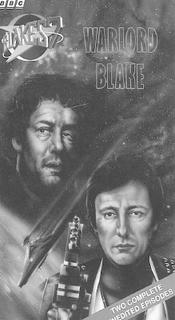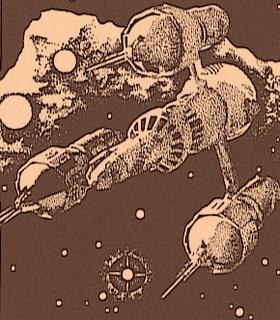 In my travels to Conventions and the like, I've discovered that many contemporary science-fiction fans are interested in the late-1970s British TV series Blake's 7, but for one reason or another have never seen it. This fine program, created by Terry Nation (the man who first imagined Dr. Who's nemesis, the Daleks), hasn't aired on the Sci-Fi Channel (that I know of...) for at least the last eleven or so years, and BBC has yet to release the series on DVD. The entire run of fifty-two hour-long episodes were available on VHS in the 1990s (two-volumes per tape), but that's a considerable investment. These tapes may still be on the market and available through secondary venues like E-bay or Half.com.
In my travels to Conventions and the like, I've discovered that many contemporary science-fiction fans are interested in the late-1970s British TV series Blake's 7, but for one reason or another have never seen it. This fine program, created by Terry Nation (the man who first imagined Dr. Who's nemesis, the Daleks), hasn't aired on the Sci-Fi Channel (that I know of...) for at least the last eleven or so years, and BBC has yet to release the series on DVD. The entire run of fifty-two hour-long episodes were available on VHS in the 1990s (two-volumes per tape), but that's a considerable investment. These tapes may still be on the market and available through secondary venues like E-bay or Half.com.But really, that's neither here nor there. Blake's 7 (and it's final episode, "Blake") is the subject of this week's Friday cult TV flashback. For those who aren't familiar with the series, a brief re-cap is in order. Blake's 7 is set in a far-future world, wherein Earth is the central planet in a fascist, totalitarian, intergalacticac organization called 'The Federation.' The Federation controls its sheep-like population through mind-altering drugs, ruthless shock-troopers and propaganda. Basically, there are a few very rich people in the Federation, but they control everyt aspect of life. Resistors are ruthlessly stamped out, put up for mock trial, and accused of bogus crimes they didn't commit (such as the ever popular charge of child molestation.)
In the first episode of the series, "The Way Back," a freedom-fighter named Roj Blake (played by Gareth Thomas) wakes up from his drug-induced equivalent of "sleep" to remember that he was once a political figure to be reckoned with, before the Federation ruined and brainwashed him. He attends a meeting of rebels who hope he will lead them again, but shock troopers massacre everybody and capture Blake, putting him on trial for child molestation, a crime he never committed. Blake is sentenced to life imprisonment on a distant penal planet, but en route, (in the episode "Space Fall,") Blake teams up with a group of other criminals including the cunning computer-expert Avon (Paul Darrow), the beautiful space pilot and smuggler Jenna Stannis (Sally Knyvette), the cowardly thief, Vila (Michael Keating) and the gentle giant with a behavior inhibitor chip in his head, Gan (David Jackson).
This core group of outcasts escapes from the Federation prison ship and takes charge of a mysterious alien derelict ship that possesses superior technology, the Liberator. Blake quickly uses the incredibly advanced vessel (which is equipped with a teleportation device...) to strike at the very heart of Federation planets and installations, and his quest for freedom and liberation becomes legend around the galaxy. Over the course of the first season, others are added to Blake's crew, including the Auron telepath, Cally (Jan Chappell), and the most-advanced computer ever designed by man, called Orac. Two years into the series, Blake disappears after a pitched space battle, leaving Avon in charge of the (often-changing) gang of rogues. The last half of the series' involves Avon attempting to lead the resistance, and trying to determine if Blake is alive or dead.
Blake's 7 is an interesting TV series because - unlike most American genre programming (excluding V: The Series) - it focuses on a leftist group of heroes resisting an overarching right-wing bureaucracy. Usually, in shows like Star Trek, Stargate SG-1 and the like, the heroes are PART of the bureaucracy (like Starfleect Command), so that alone makes it unique. But Blake's 7 has more to offer than just that distinction. Writing on page 301-302 of Science Fiction - The Illustrated Encyclopedia (Dorling Kindersley, 1995), critic John Clute noted that Blake's 7 was a "series with a sharp tendency to anarchism" and that it featured a "deliberately seedy, pessimistic ambience." Reviewer Peter Nicholls, writing in The Encyclopedia of Science Fiction (St. Martin's Press, 1993, page 133) felt the Terry Nation-created program was "addictive" and "notable for a sense of doomed helplessness." Visible Ink Press's Video Hound's Sci-Fi Experience in 1997 (on page 35) dubbed Blake's 7 "the Anti-Star Trek."
Blake's 7 is an interesting TV series because - unlike most American genre programming (excluding V: The Series) - it focuses on a leftist group of heroes resisting an overarching right-wing bureaucracy. Usually, in shows like Star Trek, Stargate SG-1 and the like, the heroes are PART of the bureaucracy (like Starfleect Command), so that alone makes it unique. But Blake's 7 has more to offer than just that distinction. Writing on page 301-302 of Science Fiction - The Illustrated Encyclopedia (Dorling Kindersley, 1995), critic John Clute noted that Blake's 7 was a "series with a sharp tendency to anarchism" and that it featured a "deliberately seedy, pessimistic ambience." Reviewer Peter Nicholls, writing in The Encyclopedia of Science Fiction (St. Martin's Press, 1993, page 133) felt the Terry Nation-created program was "addictive" and "notable for a sense of doomed helplessness." Visible Ink Press's Video Hound's Sci-Fi Experience in 1997 (on page 35) dubbed Blake's 7 "the Anti-Star Trek."

This is how I describe the series in my book, A History and Critical Analysis of Blake's 7, The 1978-1981 British Television Space Adventure: "Blake's 7 is a futuristic accumulation and translation of classic literary, film, and television traditions. It is part Robin Hood with its band of futuristic outlaws facing the overwhelming power of an evil Galactic Empire and part The Seven Samurai (1954) or The Magnificent Seven (1960) in its thematic predisposition to dramatize heroes defending the innocent from conquering forces both alien and human. Unlike Robin Hood, however, Blake's 7's television avengers are noticeably not merry men. On the contrary, the heroes of Blake's 7 are depicted...as a desperate, fatalistic and determinedly pragmatic band. Although Blake is a man of honor, his mind starts to break down after the death of a follower ("Pressure Point,") and his continued failure to defeat the mighty Terran Federation. Blake's right-hand man, Avon, is even less traditional. Equipped with a razor-sharp intellect and an instinct for self-preservation, Avon chooses to accompany Blake on his cosmic quest only because it suits his purposes. In the words of Terry Nation, his television series is not about outer space or alien civilizations at all. Instead, it concerns "the little guy against city Hall." The heroes, including a loyal "everyman," a beautiful smuggler and a common thief, are thus defined in totally realistic and believable, non-superhuman terms."
This week, I focus on "Blake," the series' final episode, because I believe that in one sense it best expresses the aesthetic of this unique and valuable TV series. The episode begins with Avon and his group of rebels on the run. Their only base has been destroyed, and so they take their ship, The Scorpio in search of Blake to the lawless world of Gauda Prime. The Scorpio is badly damaged in a space battle and it crashes on the frontier world, leaving Avon's avengers without even modest transportation. They find Blake - scarred and battle weary - but Avon thinks that his old friend has sold him out to the Federation Security forces. Blake and Avon have a final confrontation, and only one man survives. Then, the Federation troops arrive to put down the insurrection once and for all, and there is a devastating shoot-out between Federation shocktroopers and the survivors of Avon's squad.
It has often been said that one way to judge a TV series is by the manner of its ending. Think of the bizarre and enigmatic conclusion to The Prisoner, Star Trek: Voyager's return to Earth - a tidy wrap-up - or The Next Generation's return to the first episode "Encounter at Farpoint," with Q. This is the case with Blake's 7 because "Blake" expresses perfectly the overall aesthetic of Blake's 7. To wit, the finale offers an unsentimental, brutal ending to a series that takes the conclusion of Butch Cassidy and The Sundance Kid one step further. There's no polite freeze-frame here. No sir. There's a shoot-out and the dramatis-personae you have grown to love over the course of four years....go down. And that's after the stunning confrontation between Avon and Blake.
Basically, this is the episode where your hopes come crashing down. All through the series, you have followed Blake on his "impossible" dream to topple a space-spanning Federation. At times, you have actually believed that Blake - the idealist and hero - can accomplish this. Even though it is an impossible task. The final episode "Blake," makes you right your expectations. You were deluded, buddy -- there's no way this is going to have a happy ending. In fact, the strange smile that appears on Avon's face just before the end of the episode may well be his final understanding of this fact. That he too bought into a futile dream. You don't fight City Hall and win. You might disrupt it for a while, but you're just not going to beat a Galactic Federation. For me, this is a much more satisfying ending than what we see in Return of the Jedi. Take down the Emperor, destroy the Death Star and party down with Ewoks. Sorry, but It's just not that easy to bring down an entrenched, oppressive force. Blake's 7 stays true to its story line by expressing this with "Blake," a ballsy finale.
Some fans hate the ending of Blake's 7, and I can understand why. As fans, we always want to believe that "the adventure continues." That our heroes survive to fight another day. But that's really - if you examine it - not ever what this show was about. Blake's 7 concerns desperate men fighting a desperate battle, and on this day - and in their last adventure - the law catches up with them. I just love it, even if those last five minutes still leave a lump in my throat.
Today, thanks to Buffy the Vampire Slayer, Angel, Lost and other modern series, we're used to the idea of losing our favorite characters. But back in 1981, few shows were willing to take this route (Sapphire & Steel was another British series with a grim finale...) and so today I praise and remember Blake's 7 for its final episode, "Blake." This was a show (and a last episode...) that fulfilled the series' premise in spades, in an exciting, cutthroat and utterly unemotional fashion.







Thanks for the posting on Blake's Seven. I enjoyed that showm on a set of videos a pal sent me, and loved them. I found your blog after reading your wonderful Doctor Who book; when will you post about the Doctor?
ReplyDeleteThanks for the compliment on my Dr. Who book. Glad you enjoyed it. Keep watching this blog, I intend to feature our favorite Time Lord again soon on a Cult TV Flashback. Now I just have to choose which serial to highlight (a difficult task!)
ReplyDeletehehe =)
ReplyDelete